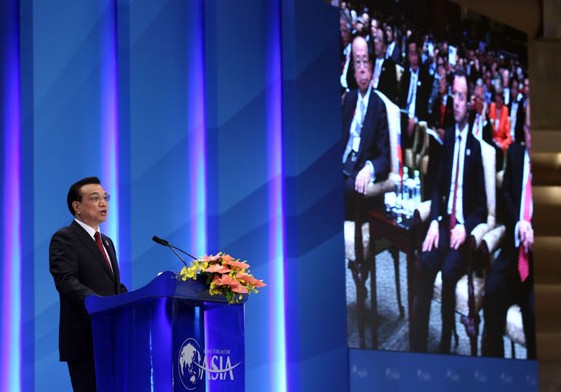

Premier Li Keqiang delivers a keynote speech at the opening of the 2014 annual conference of the Boao Forum for Asia in Hainan province on Thursday. WU ZHIYI/CHINA DAILY
Growth under 7.5% acceptable so long as adequate employment exists
Premier Li Keqiang on Thursday dismissed speculation of major policy easing amid the current economic slowdown, saying the government will not opt for a massive short-term stimulus because of "temporary" volatility.[Special coverage]
"A growth rate under this year's 7.5 percent target is acceptable so long as sufficient employment is ensured," the premier told guests at the opening ceremony of the 2014 annual conference of the Boao Forum for Asia in Hainan province.
"We will focus more on medium- to long-term healthy development," Li said, adding that China has enough options to respond to any risk and challenges and is capable of maintaining economic growth at a reasonable level.
Streamlining administration and further tax reforms are two of the options on the agenda, said Li.
The world's second-largest economy was expected to expand by about 7.3 percent in the first quarter of the year, down from 7.7 percent reported in the previous quarter. It will be the weakest since early 2009, according to a survey of 21 economists by China Business News. Final data will be out on Wednesday.
Li's remarks eased the concerns of some economists that the authorities may again opt for a massive stimulus package similar to the 4 trillion yuan ($645 billion) investment program in 2008, which pushed up asset prices and resulted in severe overcapacity.
Carlos Gutierrez, chairman of Albright Stonebridge Group based in Washington DC, said on the sidelines of the forum that Premier Li's speech gave "a very clear vision of where he wants China to go".
"It was clear, strong and visionary," Gutierrez said. He agreed with Li on not taking strong measures to stimulate the economy despite the fact it is slowing down.
"Being steady is more important than doing something fast. I think the strategy is right," he said.
"The stimulus (in 2008) brought structural damage to the Chinese economy. We are still trying to reverse it," Chen Zhiwu, a professor of finance at Yale University, said during the Boao Forum.
"Massive stimulus is the last thing China needs at the moment," said Liu Huangsong, director of the Institute of Economics at the Shanghai Academy of Social Sciences.
Although he estimated gross domestic product growth will decline further in the second quarter, maybe to below 7 percent if the government does not roll out any supporting policies, Liu said unemployment will not be a major problem.
"Because of the diminishing demographic bonus, China's labor force declined by 2.2 million in 2013.
"Loosening the second-child policy means there will be many female workers on maternity leave and more demand for nursing jobs," he said.
Although a massive stimulus package is not in sight, some economists said policy "fine-tuning" is needed to prevent a hard landing for the economy.
Xu Gao, chief macroeconomic analyst at Everbright Securities Co Ltd, said any fine-tuning may include faster approval of infrastructure projects and canceling regulations relating to the property market in cities where there is downward pressure on home prices.
Meanwhile, both Xu and Liu estimated there is room for the People's Bank of China, the central bank, to cut the bank reserve ratio once or twice this year to release more liquidity and support growth.
"After all, a stable growth rate is needed for implementing reforms," Xu said.
China won‘t resort to stimulus for temporary fluctuations
2014-04-10China economy needs no stimulus
2014-04-08Massive China economic stimulus unlikely
2014-04-01China‘s exports down 6.6 pct in March
2014-04-10China faces economic slowdown, not Minsky Moment
2014-04-01Slowdown eases growth in industrial profit
2014-03-28Copyright ©1999-2018
Chinanews.com. All rights reserved.
Reproduction in whole or in part without permission is prohibited.